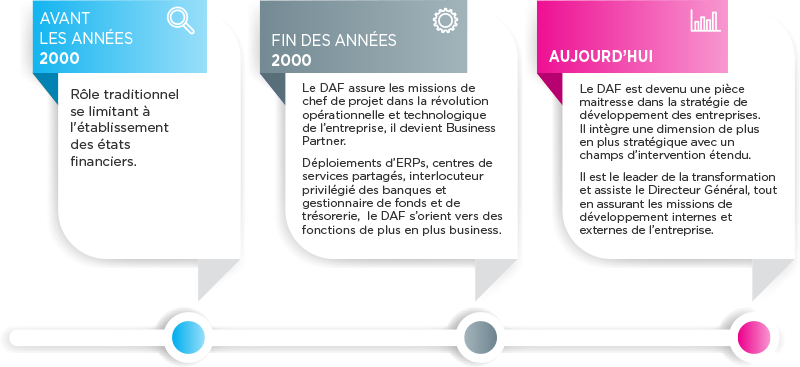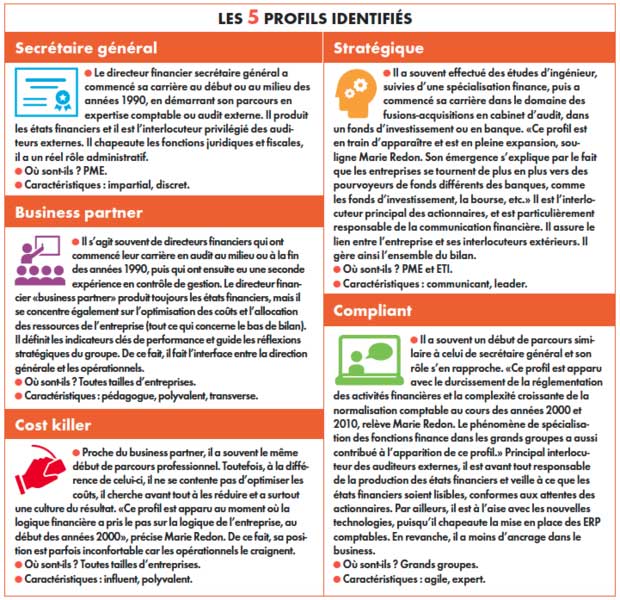A constant evolution
The role of the Chief Financial Officer (CF O) has been constantly evolving since the end of the 2000s. Digitalization has profoundly transformed the way the function and its role within the company are perceived.
Faced with the plethora of regulations (IFRS 16, GDPR, etc.), digital transformation and pressure from investors, the CFO can no longer be satisfied with being the company's "cost killer". He must accompany the change at all levels. These changes are modifying his environment, making him intervene beyond his comfort zone. He becomes a stakeholder in the strategic choices that contribute to the automation of business and cross-functional processes.
As the current financial landscape is being totally disrupted by artificial intelligence, data analytics and outsourcing, he must therefore support the General Management in making technological choices that will impact the company in the long term. These choices are both internal, via the implementation of new projects, and external, via the acquisition of Fintech or Regtech startups that will enable the company to cross competitive thresholds. The scope of these changes can range from a simple improvement of consolidation tools and harmonization of reporting, to the use of predictive analysis to optimize decision making.
A role more anchored in the business and strategy
Initially focused on the development and management of the company's financial policy, the role of the CFO must now take into account the digital transformation of the entire company.
The organization of the Finance Department around the new role
The CFO must put in place an integrated system that will allow him to be proactive both in his traditional missions and in his role as "Business Maker".
It is therefore not to be excluded that the size and profiles of the CFO's team will evolve to meet these new challenges. In addition to the traditional CFO jobs, additional profiles will be needed to react effectively to projects such as mergers and acquisitions, economic optimization, etc.
Recurring activities such as the preparation of accounts, cash flow forecasts and the production of management charts will therefore have to be carried out in parallel with a project mode operation to deal with the new type of subjects mentioned above.
When it comes to growth decisions (buyouts, integration of another company, or IPO), the CFO's advisory role takes on its full meaning: the Finance Department is the privileged contact for the CEO (or the Chairman) and potential partners.
As the privileged interlocutor of banks, shareholders, various national and international authorities, public and para-public representatives, markets and auditors, the CFO also becomes the interlocutor of the various operational and support departments of the company, but also of financial backers, brokers, financial firms and even investment funds.
A long-term change
Today, even if this new role is not yet generalized, the economic situation and the new priorities of the companies draw a trend which should be consolidated in the medium term.
The challenge will be to find the "right balance" according to the culture of each company and the skills of each CFO. It is important to avoid excesses that reinforce the image of the CFO as a "censor" who, through excessive caution, curbs the initiatives of operational staff, or conversely, abandons his or her traditional activities that remain essential to the company.
Even if the various recent economic crises have given new weight to the financial approach and, in fact, put the CFO back at the center of the game, the fact remains that the right balance between finance and operations and the quality of their joint work is key to the construction of the company's strategy and its successful implementation.
The CFO will be increasingly required, if only for the sake of credibility with other departments, to address the company's cross-functional issues and to promote communication between the various business lines.






